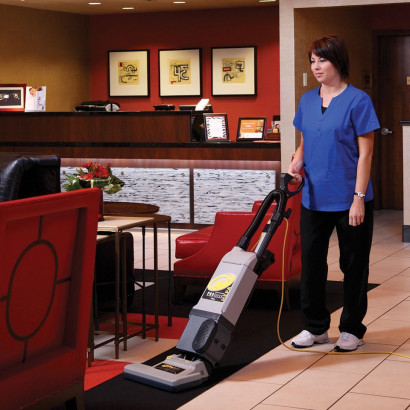How to Find the Best Commercial Vacuum Cleaner for Your Business
Regardless of the type of business you run, there's one equipment you need: a vacuum cleaner. A commercial vacuum cleaner plays a vital role in combating dirt and dust in all kinds of workplace and while the fundamental principles of commercial vacuums resemble the familiar residential machines, they're typically more robust, bigger, and several are capable of conducting various tasks.
By selecting the best industrial commercial vacuum cleaners, you can maintain sparkling floors, create an effective cleaning system, and ensure employee and customer safety. If you're in the market for this appliance, check out this guide.
Factors to Consider when Buying a Commercial Vacuum
 Established Manufacturer
Established Manufacturer
When buying a commercial vacuum, the first thing you should consider is the manufacturer. It's imperative you buy the appliance from a well known and established manufacturer who's had sufficient time to perfect it.
Although newer and lesser-known firms sell them at lower costs, you won't have the benefit of examining their track record to establish the machine's performance. Fortunately, we have a wide range of products from established brands. Moreover, we typically offer expert advice, enabling our clients to make an informed choice.
The Features
You must consider the intended purpose of the vacuum when buying it. For instance, you'll have to consider whether you'll be cleaning difficult-to-reach spots, huge, open areas, or major areas with heavy traffic.
If you have to clean hallways or spots with considerable walking traffic, an upright commercial cleaner is usually the best option. On the other hand, backpack ones are perfect for cleaning cubicles and hard-to-reach areas.
For banquet halls and conference rooms, a broad area cleaner is ideal. These can clean places that are up to 3 ft in width in one pass and have huge tanks for debris, allowing you to use them for extended periods.
Warranty
If you intend to keep your vacuum for the entire lifetime, it's advisable you obtain the longest and most comprehensive warranty possible. This way, you'll decrease the cost of repair considerably. Remember, good technicians can be expensive, so you're better off choosing a device with a long service warranty.
Moreover, you should read the fine print on the document because a number of manufacturers have warranty clauses for nearly everything.
Maintaining Commercial Vacuums
We find that most people neglect the routine upkeep of their commercial cleaner, particularly those who believe that maintenance isn't necessary if the appliance hasn't broken down. It's important to note that the failure to maintain your appliance could reduce its performance considerably. Consider these tips if you wish to extend the lifespan of your vacuum.
- Regular Inspection of Dust Bags
At the start of every shift, ensure you examine the filter bag before usage. Change the bag once it's 2/3 full instead of waiting for it to be totally full because this will limit airflow and could reduce performance.
- Examine the microfilter section
Remove any dirt and dust. If you notice the microfilter is evidently dirty or there's an odor when using the appliance, consider changing the filter.
- Examine floor tool/brushes
Remove the brush before cleaning any carpet fibers or hair stands wound around the vacuum's brush. Scissors function well at eliminating these fibers but don't cut brush bristles.
- Inspect electric cables and suction hoses
If you suspect obstruction because of lack of airflow, detach hoses and look for obstructions. If you find an obstruction, disconnect the hose and re-install in the reverse to drag the clog out. Examine the electric cables for any damage or fraying and substitute when necessary.
- Recognize your appliance's components
Being familiar with your machine's parts and recognizing how they work is essential to keep it working smoothly. For instance, brushes on any segment of the machine shouldn't wear down to over ½ their length; once they do, replacement is necessary.
In the interim, you should keep them debris-free and clean them intermittently with a disinfectant. If your vacuum has a recovery tank, you should empty it as often as possible; otherwise, detergent residue might accumulate and lead to allergen-causing mold.
You should also examine the machine's belts weekly. If you detect a burning smell, it's typically an indication of a problem, for instance, the belt slipping.
When you follow the fundamental principles of vacuum maintenance, you'll maintain the machine's life while presenting a cleaner facility to your clients and protect your crew's health.




Log In
Create New Account